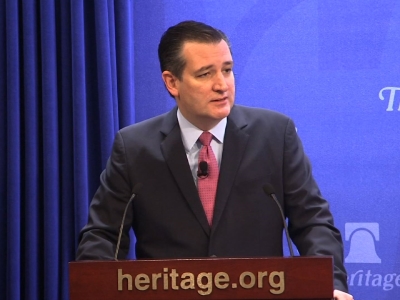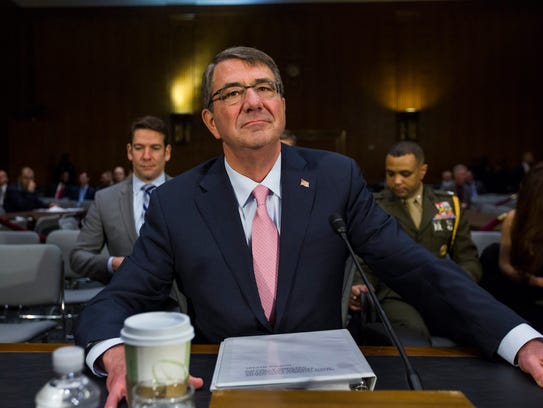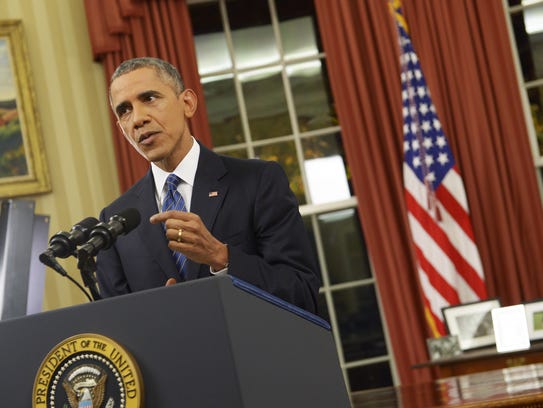Luke Skywalker
Super Moderator
{vb:raw ozzmodz_postquote}:
Get the news
Log In or Subscribe to skip
1 [h=6]Share This Story![/h]Let friends in your social network know what you are reading about
[h=4]On ISIL, rhetoric is biggest divide between Obama, GOP candidates[/h]The rhetoric of Republican presidential candidates blasting President Obama’s approach to combating Islamic State terrorism suggests a huge policy divide.
{# #}
[h=4]Sent![/h]A link has been sent to your friend's email address.
[h=4]Posted![/h]A link has been posted to your Facebook feed.
[h=6]Join the Nation's Conversation[/h]To find out more about Facebook commenting please read the Conversation Guidelines and FAQs
[h=2]UP NEXT[/h][h=2]03[/h]
Taking on critics in his own party, Republican presidential contender Sen. Ted Cruz on Thursday defended Middle East dictators as useful allies against Islamic extremists during a speech in Washington. (Dec. 10) AP
Donald Trump and Ted Cruz greet each other on stage during a rally organized by Tea Party Patriots on Capitol Hill on Sept. 9, 2015, to oppose the Iran nuclear agreement.(Photo: AP)
The rhetoric of Republican presidential candidates blasting President<span style="color: Red;">*</span>Obama’s approach to combating Islamic State terrorism suggests a huge policy divide.
Ted Cruz accuses Obama of “leading from behind” and Donald Trump says he’s “losing the war on terrorism," part of a verbal lashing<span style="color: Red;">*</span>they've administered to the president since the shootings in San Bernardino, Calif.
Yet<span style="color: Red;">*</span>they’re mostly proposing<span style="color: Red;">*</span>things the administration is already doing.
In the wake of the Paris terror attacks<span style="color: Red;">*</span>—<span style="color: Red;">*</span>and along with the Russians, French and British —<span style="color: Red;">*</span><span style="color: Red;">*</span>the U.S. has stepped up airstrikes, including of oil fields, and sent in more special operations forces in addition to the roughly 3,500 troops advising and assisting in Iraq. The U.S.-led coalition helping to provide assistance to the Free Syrian Army<span style="color: Red;">*</span>has grown to 65 member countries, including Arab nations.
USA TODAY
Special operations strike force heading to Iraq
Although candidates like Marco Rubio<span style="color: Red;">*</span>have blasted Obama for not directly arming the Kurds, this has been happening indirectly through ground deliveries and<span style="color: Red;">*</span>air drops in Kurdish-controlled areas to avoid a diplomatic strain with Turkey.
None of the major candidates is pushing<span style="color: Red;">*</span>for a major U.S. troop presence along the lines of the<span style="color: Red;">*</span> 2003 invasion of Iraq, which would be a clear distinction with Obama. Mostly, they’ve offered colorful language about dropping bombs. Cruz said he’d make sand “glow in the dark," for instance,<span style="color: Red;">*</span>and Trump vowed to “bomb the hell” out of the Islamic State, also known as ISIS or ISIL.
“The same criticism of President Obama’s strategy with respect to ISIS can be leveled against virtually all of his critics,” said Christopher Preble, vice president for defense and foreign policy studies at the Cato Institute, a libertarian policy group. “This debate is misleading,” he said.
The biggest difference between the two parties is<span style="color: Red;">*</span>the approach to<span style="color: Red;">*</span>immigration challenges at home, with Trump calling for a ban on<span style="color: Red;">*</span>non-citizen Muslims from entering the country and others supporting an indefinite ban on Syrian refugees — and not the Middle Eastern ground battle that’s so fiercely debated.The candidates are likely to be pressed for more specificity about their approaches<span style="color: Red;">*</span>at the first debate since the Calif. shootings, which will be Tuesday in Las Vegas.
ONPOLITICS
Republicans denounce Obama's terrorism speech
ONPOLITICS
Cruz: 'Destroy Islamic State,' avoid intervention
It’s only been recently that a number of candidates, including Trump and Cruz, who's<span style="color: Red;">*</span>openly opposed ground troops, have taken a more aggressive stance about the U.S. role in the region. Hillary Clinton has backed a no-fly zone in Syria, putting her at odds with the president and in step with many Republicans including Jeb Bush. Yet that would necessitate a large number of troops, something they aren't proposing.
“No Republican candidate has defined what they intend to do, except defeat ISIS in the most generic sense,” said Tony Cordesman, a national security expert at the Center for Strategic and International Studies who<span style="color: Red;">*</span>consulted the departments of State and Defense during the Afghan and Iraq wars.
“This is almost a campaign of slogans rather than plans or solutions at every level,” said Cordesman, who has also advised Arizona Sen. John McCain, the 2008 GOP presidential nominee.
USA TODAY
2016 Candidate Match Game
[h=2]Troop presence[/h]The administration is gradually increasing troops on the ground in the region. This includes a special force to assist Kurdish Peshmerga, Defense Secretary Ash Carter told a Senate panel<span style="color: Red;">*</span>Wednesday. Other than<span style="color: Red;">*</span>South Carolina Sen. Lindsey Graham, who's called for 20,000 troops split between Syria and Iraq, the candidates aren't offering specifics. Ohio Gov. John Kasich has also broadly called for "boots on the ground."
USA TODAY
Carter, McCain tangle over Pentagon's Islamic State strategy
In October, Trump called those advocating for more direct military intervention "fools" who "basically want to start World War III over Syria." Even the field's biggest hawks, like Rubio and Bush, say<span style="color: Red;">*</span>the bulk of ground troops should be Arab fighters, a theoretical 100,000-strong force the administration has<span style="color: Red;">*</span>struggled to encourage.
“This is a radical Sunni group, they need to be defeated by Sunnis themselves on the ground,” Rubio said in a Dec. 6 appearance on CNN’s State of the Union.<span style="color: Red;">*</span>On Dec. 7 on MSNBC, Bush said “local forces” must lead the way. Many have deflected the question about ground troops by saying they'd rely on military advisers..
Defense Secretary Ash Carter prepares to testify at a Senate Armed Services Committee hearing on Dec. 9, 2015.<span style="color: Red;">*</span>(Photo: EPA)
The lack of distinction with the current strategy frustrates Republicans like James Jeffrey, who served as deputy national security adviser to President George W. Bush.
“Nobody wants to say ‘ground forces,’” said Jeffrey. “If we really want to get a real coalition going forward, trying to do this without some Americans on the front lines is ridiculous.”
Neither the White House nor Republicans have realistic expectations, said Preble. “What Sunni Arabs? Do you think you have some magic formula for finding them that the Obama administration hasn’t tried?” he said.
[h=2]More bombing[/h]Cruz and Trump have used the most aggressive language about the need for more intense bombing, with Cruz recently promising to "carpet bomb them into oblivion." Yet they’ve offered no specifics about targets<span style="color: Red;">*</span>or parameters or<span style="color: Red;">*</span>why their approach would be any more effective.
Carter testified, due to improved intelligence, that the<span style="color: Red;">*</span>U.S. has intensified air strikes, destroying 400 of ISIL's oil tanker trucks and killing its<span style="color: Red;">*</span>leader in Libya.
The overwhelming criticism following Obama’s Dec. 6<span style="color: Red;">*</span>Oval Office address to the nation centered on<span style="color: Red;">*</span>his language.
President Obama addresses the country from the Oval Office on Dec. 6, 2015.<span style="color: Red;">*</span>(Photo: Getty Images)
In a foreign policy address on Thursday,<span style="color: Red;">*</span>Cruz devoted most of his time to criticizing Obama. He and Trump have slammed the president for not using the term “radical Islamic terrorism.” They’ve also criticized his<span style="color: Red;">*</span>comments from early 2014<span style="color: Red;">*</span>calling ISIS the “JV<span style="color: Red;">*</span>team.” Prior to Paris, Obama also said ISIS has been geographically contained.
USA TODAY
Analysis: San Bernardino redefines Obama's remaining time in office
There's a good reason that the real<span style="color: Red;">*</span>policy battle right now is over rhetoric, said Cordesman.
“There really aren’t good options” on the ground right now, he said. “Trying to be the defender of the least bad option presents obvious political problems.”
Follow<span style="color: Red;">*</span>@HeidiPrzybyla<span style="color: Red;">*</span>on Twitter.
0) { %> 0) { %>
0) { %>
Powered By WizardRSS.com | Full Text RSS Feed
